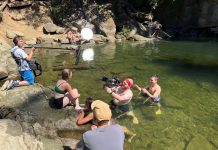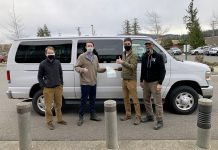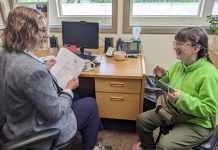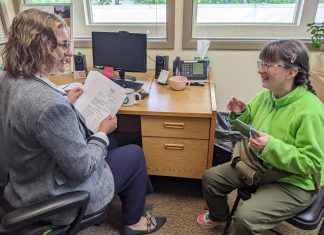In 2016, to provide patients with expanded surgical options, PeaceHealth St. Joseph Medical Center purchased the da Vinci® Si Surgical System. This robotic surgical machine is integral to the success of many urological operations, working in tandem with a team of doctors and nurses.

Over the last 15 years, robotic-assisted surgery for urological conditions has increased in popularity in the United States. Prospective urologists undergo training to specialize in the field of robotic-assisted and minimally-invasive surgery. Dr. Daniel Roeter is one of these urologists. In 2016, he finished studying under world-renowned urologist Dr. Inderbir Gill at the University of Southern California.
Here’s what happens when Dr. Roeter uses the machine to perform a typical urological operation:
Once turned on, the da Vinci is powered by technology that allows Roeter’s movements to become more precise. Roeter uses his hands on “pincher-like” controls to make movements the robot will mimic, which will be translated to the instruments the robot holds.
As opposed to laparoscopic surgery, which uses 2D cameras, the da Vinci® Si Surgical System operates with 3D cameras that provide high definition visualization. This feature gives Roeter better visuals of the patient when performing surgery.
“We aren’t on autopilot or anything,” Roeter says. “I am right there operating the machine. A lot of people hear the word “robot” and they think the machine is going to perform the operation on them. That isn’t the case; my team and I are there every step of the way.”
Dr. Roeter is a urologist for Pacific Northwest Urology Specialists in Bellingham and traveled across the entire United States to receive his training. Originally from Spokane, he’s since lived in the South, Midwest, Pacific Northwest and Southern California. Each of these regional stops was necessary and all helped him get where he is today. Each taught him different skills he now incorporates in his day-to-day operations.
Dr. Roeter attended Western Washington University for his undergraduate studies, where he majored in biochemistry. Perhaps it was then he developed his love for Whatcom County.
“I’m not sure that right after college I knew I was going to live in Bellingham again,” Roeter says. “But following years of traveling for my studies, my wife and I thought it would be a good fit for our family to live here.”
Roeter knew he wanted to become a doctor since his freshman year of college at Clark College in Vancouver, Washington, where he got his associate’s degree before heading to Western. After that, it was off to far flung new places. Dr. Roeter attended medical school at the University of Miami, and then his residency at Wayne State University in Detroit.
“I wanted to practice urology because in this profession you can see that patients are very happy and relieved once they’re finished with surgery,” Dr. Roeter says. “A lot of the procedures we do help people who were once feeling very miserable, recover.”
When Dr. Roeter enrolled in his fellowship, he performed surgery under the guidance of supervising physicians on many occasions. In fact, in the fellowship alone, he completed over 225 robotic surgery cases. He says it makes you excited when the time and work you’ve put in really shows, and the supervising physicians realize you can handle the situation; it gives you confidence heading into the profession on your own.
Dr. Roeter now treats all adult urologic conditions including enlarged prostate, kidney stones and forms of cancer. Robotic surgery is mostly used for oncological surgical needs.
“I think the future of urology is headed toward developing and utilizing single port surgery,” Dr. Roeter says. “Right now, even with machine assistance, we use five incisions when performing most surgeries, but the idea is to move toward one larger incision, which will allow the patient to have a faster healing time.”
Most frequently, Dr. Roeter uses robotic-assisted surgery to remove prostates, kidneys and tumors in patients with cancer. He has done over 100 robotic cases in the last two years. He encourages getting prostate-specific antigen (PSA) tests to screen for prostate cancer for those men ages 55 and up.
For more information or to schedule an appointment, visit Pacific Northwest Urology Specialists’ website. And keep up to date with their official Facebook page, YouTube channel and Instagram account.
Pacific Northwest Urology Specialists
3232 Squalicum Parkway
Bellingham






































